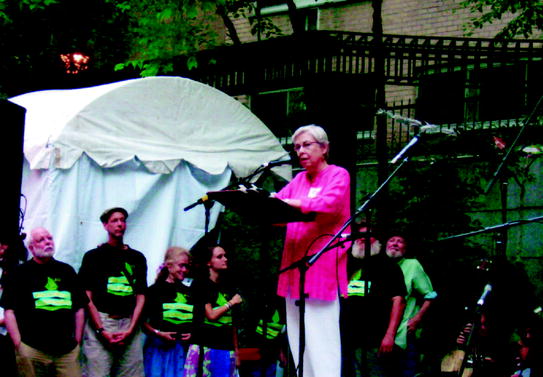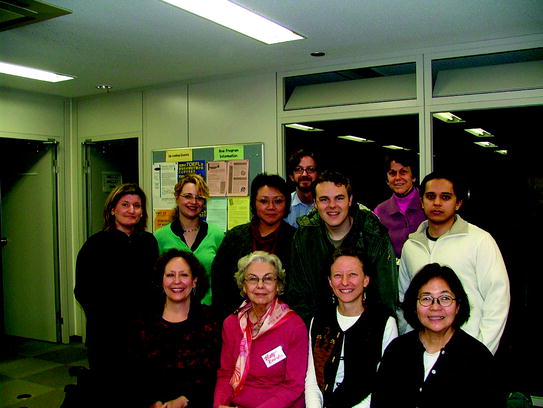Human Rights and the Renewal of the University

Celebrating 75th birthday in New York with Werner Wintersteiner 2004. Source Personal photo collection of the author
Within such a conceptual framework, focusing on the substance of human rights and framing peace education as learning toward their fulfillment, we can begin to envision peaceful institutions as infused with human rights, paramount among those institutions would be ones through which we educate, most especially the university. So, when I was invited Professor Werner Wintersteiner to come to Klagenfurt University in Austria by the Center for Peace Research and Education to teach an intensive course on human rights as peace education as the first step in envisioning and developing a human rights university, I was delighted. I took up the task with hope that in the waning years of my career I might do something positive toward transcending my on–going critique of the academy initiated in “The Knowledge Industry.”
This challenging task also provided me with an opportunity to reflect on the whole field of human rights education that had been developing through recent decades. As with peace education, there were various approaches, differing in emphasis, methods, and learning audiences. Some human rights educators argued that their own particular approaches were the most effective ways of educating for the common goal of a just world order. I, too, had a strong preference for human rights learning to the point that I advocated it in the Master’s lecture at the University of Puerto Rico delivered the year before the lecture at Klagenfurt on which the selection below is based. The Klagenfurt assignment pushed me to revise and refine my position, striving toward a comprehensive view of the field into which all the approaches to the field I was able to identify might be integrated. The major approaches as I perceived them are outlined in this selection in an attempt to acknowledge the particular contributions each could make to an institution seeking to educate for and a society actively endeavoring to achieve an authentically just public order.
Betty A. Reardon
April 12014
12.1 Human Rights, a Response to the Problematic of Contemporary Universities
The modern university, like so much of society, has taken on the values of the corporate culture and the global market. Knowledge has become a commodity, the currency of success in the market; critical analysis is an exercise in perfecting technique for increasing material value; and wisdom is relegated to history and philosophy, realms that do not enjoy high value in a market-centered academy. The formation of reflective thinkers and responsible members of society would seem to have become the purview of seminaries and religious institutions, as universities prepare students for success in a highly competitive world, governed by a compulsion toward the amassing of wealth and power. Ethical reflection and involvement in the arts are the indulgences of leisure. The purpose of education is read more as perfecting skills of competition than at perfecting the human condition. Practical intelligence is valued while reflective valuing is considered impractical. What, we may ask, might those who still harbor some hope that the human condition could yet become a central concern of the modern academy advocate as a path to realizing that hope? The response, a case for which I set forth here, is human rights.
The state of the university and the social value system it reflects has begun to provoke a world-wide reaction against corporate power and the ‘commoditization’ of education along with other elements of the social order essential to the realization of our humanity. Some university faculty members have taken courageous stands to resist, in an attempt to preserve the integrity of the academy. There are students protesting on public squares and universities in numbers and vigor not seen since the pivotal year of 1968 in which student ‘unrest’ exploded in Europe, the United States, Latin America and even some few campuses in Japan. Today Canadian, Chilean, US-American students among others, inspirited by the call for justice that ‘occupy’ movements the world over have breathed into the political atmosphere, are demanding change. They are rebelling against a life-long burden of debt as the price of an education less than relevant to the lives they envision. They are essentially demanding the fundamental human right to an education that will equip them to live as fulfilled human beings contributing to a society striving toward the conditions of human fulfillment, a vision that has enlivened centuries of the struggle for the realization of human dignity through the implementation of human rights. That vision, I assert, should inform the mission of the university and all that it comprises in the intentional learning derived from research and teaching in all the fields that constitute human knowledge.
To renew the traditional mission of the university as provider of authentic knowledge and relevant learning in the service of the development of persons and the societies in which they live their lives, there is no better means available to us than human rights. The goals and values of human rights are those most suitable to confront the competitive—frequently corrupt—materialism that has infected society. As the university has not been immune, serving as a carrier of the infection, so too, it can deliver the antidote. The prescription is a university wide infusion of human rights, compounded from the fundamental principles of universal human dignity, ethical responsibility and social justice. These, I argue, are the principles which should infuse the structures and programs of the university, and inform the norms and behaviors of those within it. The faculty members who hope that a human rights university can be developed at Klagenfurt offer an opportunity to test the proposition that a university can be devoted to learning for a more socially healthful human future.
12.2 The University as Learning Community
Above all, a human rights university would be a learning community. The pedagogy of critical, comprehensive peace education, a close relative to human rights learning, cultivates learning communities as environments in which learning is maximized and enriched by education of the participants, for the participants, and by the participants. It is, critical peace education practitioners argue, the atmosphere most conducive to educating for responsible, democratic citizenship, fully consistent with the norms and principles of human rights, most effective for the practice of critical pedagogy, integral to comprehensive peace education and human rights learning.
My conception of the nature and composition of an authentic university learning community derives from ideas advanced by students in a course I offered at Klagenfurt in the spring of 2010 when the idea of a human rights university had first been proposed. Their focused and value-aware reflections deeply influenced what I believe the concept of such an institution entails. The learning process of the course which centered on human rights learning and the possibilities for a human rights university played out in an atmosphere of open inquiry that I felt privileged to be part of. It was an experience that re-enforced my own sense of course convener as participant in a learning community. I am indebted to that community for the origins of much of what follows in this essay.
The university as a learning community comprises all who participate in the planned learning programs and processes and all who make them possible: students, teaching assistants, faculty, administration, office support staff, food services, buildings and grounds crew and custodial-security workers. All play essential roles necessary to establish, maintain, and develop the learning environment of the university. Each is a subject of human rights, endowed with human dignity. All are included in the moral community of the university that determines the quality of human relationships throughout the institution. Moral inclusion is the manifestation of the right to be held within the realm of justice and fair treatment and to have your and your group’s interests and perspectives taken into consideration. The full unambiguous moral inclusion of all in the quotidian life of the university, as well as their participation in a human rights-centered institution serves as an indicator of the implementation of and commitment to the values integral to the concept of universal human rights.
As an institution undertakes to become a human rights university, everyone should be involved in all phases of planning and implementation. Reflecting on what the roles of each might be in the human rights learning community of the university would in itself be a community building process. Each person as an individual and the respective groups comprising each component of the community should themselves initiate a reflective inquiry into the possibilities for their particular contributions to the learning environment. Each person individually and each group together should also be invited to assess their current roles and experiences of the moral community of the university. If environmental or institutional change is needed to affect a successful process of development into a human rights university, such assessment could provide a starting point in planning the requisite changes. Such planning would certainly indicate the authenticity of the human rights intentions of those who issue the invitations to participate.

Participants in Teachers College Tokyo, Peace Education Certificate Course 2005. Source Personal photo collection of the author
The inclusivity of the community would be sustained by an ethos and ethic of human rights, not necessarily materially evident or visible any more than are the normative principles cited as rationale in the mission statement of a human rights university, but rather felt in the social atmosphere of the learning community. Essentially, an abstract spirit that manifests itself primarily in the attitudes and stances of moral inclusion that would characterize more than any other attribute of a human rights university, a human rights ethos would be the heart—or the soul, i.e., the agent of ethical self-reflection—of the institutional identity. Members of the entire community would recognize themselves personally, as well, as persons who respect human dignity and seek truth.
The ethos of inclusion would be infused throughout the interactions, dialogues, discussions and debates by which the mission is communicated and carried out. It would make it possible to address the most controversial and severe differences as open inquiry into truth to be reasonably and respectfully pursued, knowing that the risk faced would be change in view or position, not denigration of ideas or affronts to personal dignity. Through language, process and stances assumed by the disputants, the ethos would be manifest and moral inclusion would become more deeply ingrained in the mindsets of the participants. Above all, it would help the university to transcend some of the ideological polarization that prevails in the ethos of the current adversarial political culture, a polarization that tramples human rights, represses the seeking of truth and blights the academic soul of the university.
It is not only for the sake of the abstractions of truth-seeking and respecting human dignity that the form of communication I have referred to as “civil disputation” and as “constructive/creative/contention” is nurtured in community.1